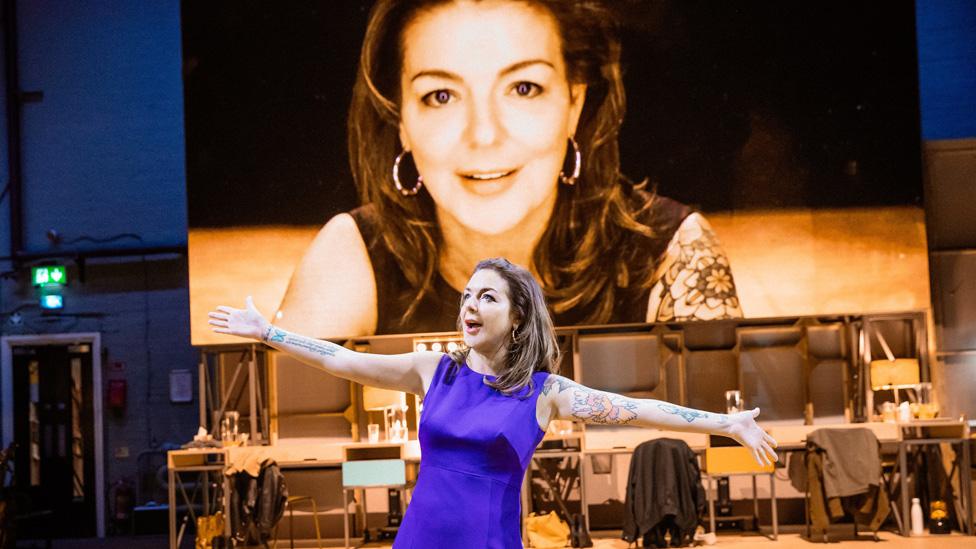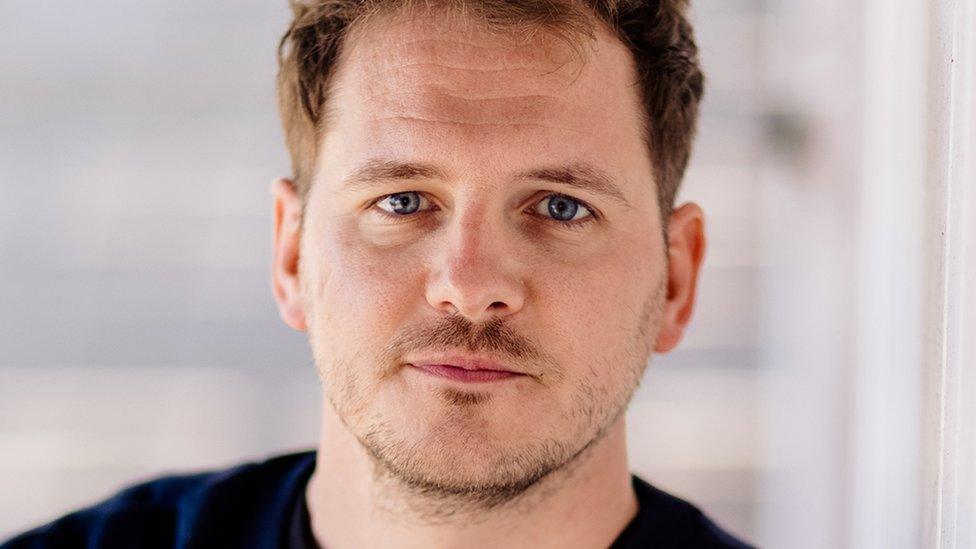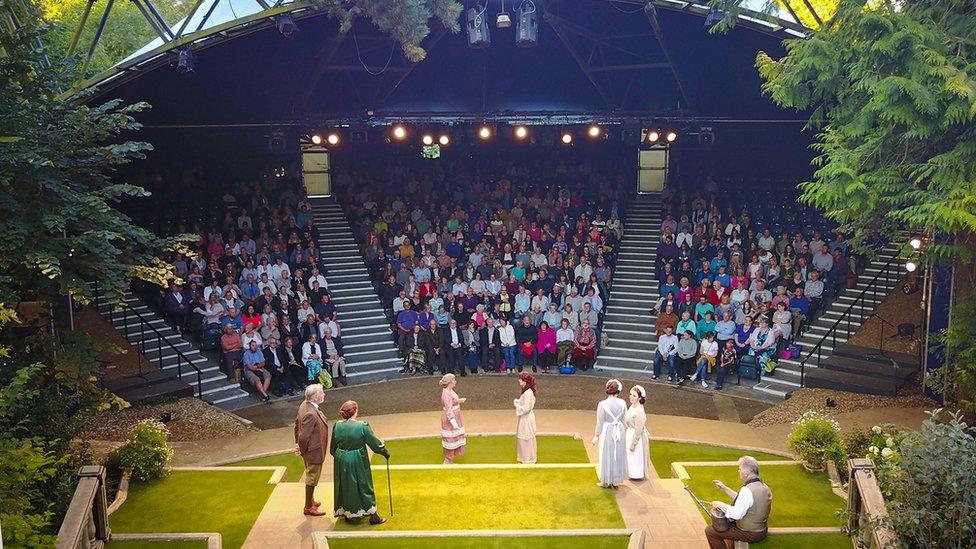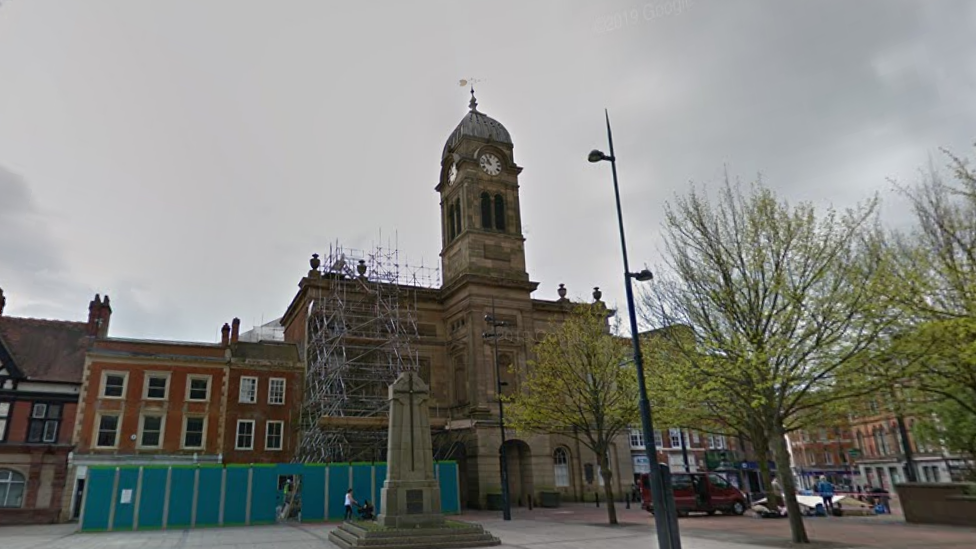Arts firms 'in middle of perfect storm', says Hull theatre director
- Published

Middle Child's new production Baby, He Loves You opens in Hull on Friday
Arts organisations are "in the middle of a perfect storm", struggling to attract audiences and survive, a theatre director has said.
Paul Smith, who runs Middle Child in Hull, said the cost-of-living crisis and the pandemic had resulted in fewer people attending live shows.
His comments came after he posted a blog detailing the company's financial woes in a bid to boost ticket sales.
Middle Child launches its new show Baby, He Loves You, on Friday.
Mr Smith, artistic director and chief executive of the 13-year-old theatre company, said a 53% drop in audiences in the last five years had prompted him to speak out for the organisation, which last week had seen only 32% of tickets being sold for its new £90,000 production.

Audience attendance has dropped by more than half in the last five years, Middle Child says
"We're in the middle of a perfect storm at the moment," he said.
"We're finding fundraising is more competitive than ever. We're finding costs going up and income levels not going up.
"While times are hard, people are having to choose between essentials and things that are seen as luxuries."
Mr Smith said, while mid-sized companies like Middle Child were "fighting" for survival, there were other areas of the theatre industry that were "really thriving" due to a trend in star-studded plays hitting the West End.

Pussycat Dolls' singer Nicole Scherzinger is among the celebrities starring in solo or small-cast plays
Speaking on BBC Radio 4's Today recently, Kate Maltby, theatre critic for Prospect magazine and chair of the Critics' Circle, said she believed the trend for celebrity-named shows was "about economics".
"Theatre is still struggling to recover from the Covid crisis. I don't think one can possibly overstate what an existential threat that was," she said.
However, it seems not even celebrities are immune to the current economic climate faced by many arts organisations.
Last week producers of West End musical Opening Night, starring Epworth-born Sheridan Smith, announced the show would close two months early due to "a challenging financial landscape".

Sheridan Smith plays an actress whose mental health deteriorates after the death of one of her fans in Opening Night, which is to end two months early
"We're really having to fight for a cultural future which champions new voices, new work, rather than relies on existing IP [intellectual property] or celebrity names," said Mr Smith.
"We're all having to be really creative in how we respond to this crisis."
Luckily for Middle Child, the blog post, external had created a "positive reaction" for the company, with the number of tickets sold increasing from 403 to 662 in four days.
However, the company said it would need to sell about 1,500 tickets to break even.
Despite tens of thousands of pounds of funding and financial support from various sources including the Arts Council and local authority, the decline in audience numbers since 2019 has meant the company would still need to plug an annual £35,000 gap in revenue, according to Middle Child's bosses.

Middle Child's Paul Smith: "We're really, really scared of how things are shaping up"
While Middle Child is not in "immediate threat" of closing its curtains for good or slashing performances, Mr Smith fears the company "could be gone in two to three years' time" if nothing is done.
Less than 100 miles away on the Lincolnshire border, the Stamford Shakespeare Company is in a similar position.
Marketing and Theatre Manager David Fensom said the seasonal outdoor theatre company used to see audiences of about 34,000 at its open-air auditorium in Stamford during the summer months but, since the pandemic, attendances dropped to "under 27,000 last year".
Despite a £240,000 Cultural Recovery Fund grant and a public fundraiser in 2020 to keep the company afloat, Mr Fensom said it "has been a struggle financially".
"We're a good 7,000 less [in audience numbers] than we were doing, which sort of equates to around £150,000 in terms of revenue, and we rely on that totally as a charitable organisation and a not-for-profit organisation.
"We totally rely on the income from our ticket sales. And if the audience is low and we're not getting the money in, we've got problems."

Stamford Shakespeare Company says it "totally" relies on the income generated from ticket sales
Mr Fensom said the company has had to "think creatively" with its theatre programming by staging more "adventurous" and popular productions to save it from failing financially.
"We certainly couldn't survive many years on not getting enough audiences, so I don't know how long we could survive for, I would think maybe two or three years at most. We're hoping it doesn't come to that. Ticket sales were better than [the year before] so we're remaining optimistic for the future."
Back in Hull, Middle Child hopes its new show, which runs until 28 April, will "remind people why supporting local theatre and art is so important", said Mr Smith.
"I think we all feel this pressure to pretend everything's ok and pretend everything's a great success, [but] behind closed doors, [we're] really, really scared of how things are shaping up."

Follow BBC East Yorkshire and Lincolnshire on Facebook, external, X (formerly Twitter), external, and Instagram, external. Send your story ideas to eastyorkslincs.news@bbc.co.uk, external
- Published16 April 2024
- Published15 April 2024
- Published15 April 2024
- Published11 April 2024

- Published11 April 2024

- Published27 January 2024
